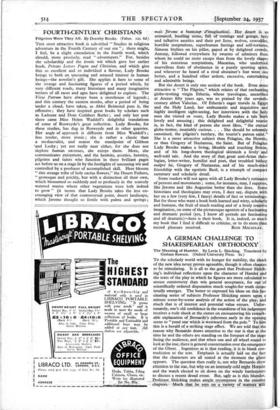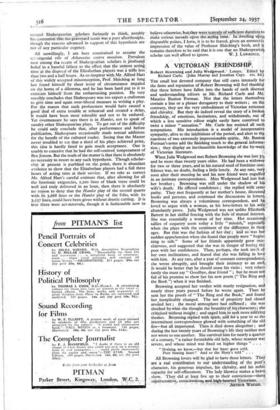A GERMAN CHALLENGE TO SHAKESPEARIAN ORTHODOXY
The Meaning of Hamlet. By Levin L. Shucking. Translated by Graham Rawson. (Oxford University Press. 6s.)
To the scholarly world with its hunger for stability, the shOck of the new idea never proves agreeable, though it often channes to be stimulating. It is all to the.good that Professor Shack- ing's individual reflections upon the character of Hamlet and the texts of the play in which he figures are more calculateilto arouse controversy than win general acceptance, for out ;of scientifically ordered disputation much sought-for truth Occas- ionally emerges. The better to expound his ideas on this fas- cinating series of subjects Professor Shacking enters upon a minute scene-by-scene analysis of the action of the play, and Much that is of interest and potential value ensues. Unfor- tunately, one's old confidence in the soundness of his judgement receives a rude shock at the outset on encountering his remark- able explanation of /3emardo's reference early in the opening scene to " yond star which is westward from the pole." To him this is a herald of a striking stage effect. We are told that-the reason why Bernardo draws attention to the star is that at ,the time he and the others are standing on the forepart of the stage facing the audience, and that when one and all wheel round to look at the star; there is general consternation over the emergence of the Ghost. Ingenious as is that reading, it is in blank con- tradiction to the text. Emphasis is actually laid on the fact that the characters are all seated at the moment the ghost appears. The question then really is, not why Bernardo drew attention to the star, but why on an intensely cold night Horatio and the watch elected to sit down on the windy battlements to discuss a recent dread event. But, ugly as is this blunder, Professor._ Shucking makes ample recompense in the ensuing chapters. Much _that, he says on a variety of matters *ill
compel Shakespearian scholars furiously to think, notably his contention that the graveyard scene was a pure afterthought, though the reasons advanced in support of this hypothesis are not of any particular cogency.
All unwillingly, I am here constrained to assume the un:ongenial role of Athanasius contra mundum. Prevalent now among the cream of Shakespearian scholars is profound belief in a baneful fallacy to the effect that the utmost acting time at the disposal of the Elizabethan players was a trifle less than two and a half hours. As co-inspirer with Mr. Alfred Hart of this widely accepted misconception, Prof. Shucking at long last found himself by sheer irony of circumstance impaled on the horns of a dilemma, and he has been hard put to it to extricate himself from the embarrassing position. He very sensibly concludes that Shakespeare was too expert a craftsman to give time and again over-liberal measure in writing a play. For the reason that such profuseness would have caused a good deal of extra trouble at rehearsal and created a delay, it would have been most tolerable and not to be endured. Yet overmeasure he says there is in Hamlet, not to speak of sundry other Shakespearian plays. To get out of the difficulty he could only conclude that, after performance and before publication, Shakespeare occasionally made textual additions for the benefit of the cultured reader. Seeing that the Master never troubled to see that a third of his plays achieved print, this idea is hardly fated to gain much acceptance. One is unable to conceive that he had the self-centred temperament of Ben Jonson. But the truth of the matter is that there is absolutely no necessity to resort to any such hypothesis. Though scholar- ship at present is purblind on the point, there is abundant evidence to show that the Elizabethan players had a full three hours of acting time at their service. If we take as correct Mr. Alfred Hart's careful estimate that, after allowing for all the histrionic exigencies, 1,zoo lines of blank verse could be well and truly delivered in an hour, then there is absolutely no reason to deny that the Hamlet play of the second quarto with its 3,668 lines or the Hamlet play of the folio, with its 3,537 lines, could have been given without drastic cutting. It is true there were act-intervals, though it is fashionable now to
believe otherwise, hut-they were scarcelypfsufficient duration to make serious inroads upon the_ acting time.' In dwelling upon disputable points, I have, it is to be feared, given an erroneada impression of the value of Professor Shilcking's book, and it remains therefore to be said that it is one that no Shakespeariai scholar can well afford to ignore. W. J. LAWRENCE.



















































 Previous page
Previous page